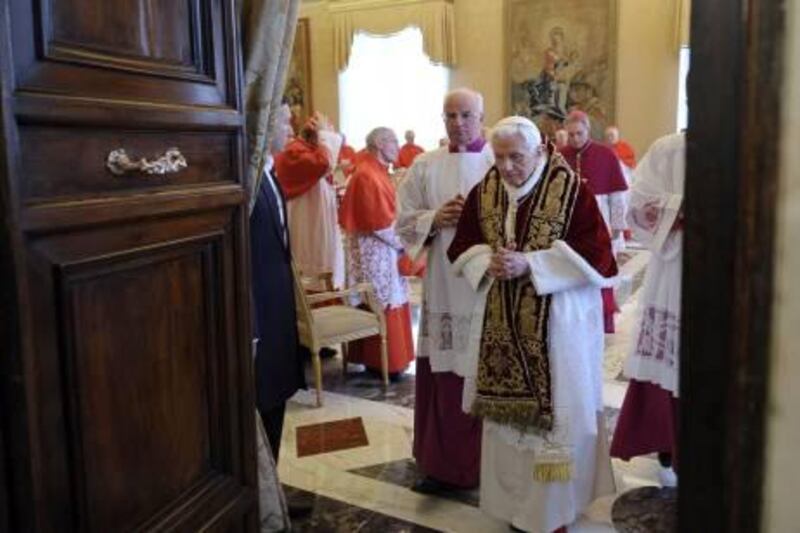VATICAN CITY // Pope Benedict shocked the world yesterday by saying he no longer had the mental and physical strength to cope with his ministry, in an announcement that left his aides "incredulous" and will make him the first pontiff to step down since the Middle Ages.
The German-born pope, 85, hailed as a hero by conservative Roman Catholics and viewed with suspicion by liberals, told cardinals in Latin at a meeting yesterday morning that his strength had deteriorated recently.
"For this reason, and well aware of the seriousness of this act, with full freedom I declare that I renounce the ministry of Bishop of Rome, Successor of Saint Peter, Pope Benedict said."
The move sets the stage for the Vatican to hold a conclave to elect a new pope by mid-March, since the traditional mourning time that would follow the death of a pope does not have to be observed.
The Vatican spokesman Father Federico Lombardi said the Pope had not decided to resign because of "difficulties in the papacy" and that the move had been a surprise, indicating that even his inner circle was unaware that he was about to quit.
Pope Benedicts' leadership of 1.2 billion Catholics has been beset by child sexual abuse crises that tarnished the church, an address in which he upset Muslims, and a scandal last year over the leaking of his private papers by his personal butler.
The last pope to resign willingly was Celestine V in 1294 after reigning for only five months. His resignation was known as "the great refusal" and was condemned by the poet Dante in the Divine Comedy. Gregory XII reluctantly abdicated in 1415 to end a dispute with a rival claimant to the papacy.
Fr Lombardi ruled out depression or uncertainty as being behind Pope Benedict's resignation, saying the move was not due to any specific illness, just advancing age.
In recent months, the Pope has looked increasingly frail in public, sometimes being helped to walk by those around him.
The Pope's brother, Fr Georg Ratzinger, said he had known "for a few months" that he was planning to resign.
"The reason for his resignation is indeed that he is feeling the burden of his age ... I have known for a few months that this was planned," he said.
"He knows the demands of the office. I think his decision is correct. It is a positive thing that he is handing over the office to younger hands," said Fr Ratzinger, who was ordained at the same time as the Pope and is four years his senior.
Pope Benedict himself raised the possibility of resigning if he were simply too old or sick to continue on in 2010, when he was interviewed for the book Light of the World.
"If a pope clearly realises that he is no longer physically, psychologically and spiritually capable of handling the duties of his office, then he has a right, and under some circumstances, also an obligation to resign," he said.
Popes are allowed to resign; church law specifies only that the resignation be "freely made and properly manifested".
Elected on April 19, 2005 when he was 78 years old, 20 years older than John Paul was when he was elected, and the oldest pope elected in nearly 300 years – Pope Benedict ruled over a slower-paced, more cerebral and less impulsive Vatican.
But while conservatives cheered him for trying to reaffirm traditional Catholic identity, his critics accused him of turning back the clock on reforms by nearly half a century and hurting dialogue with Muslims, Jews and other Christians.
Under his meek demeanour lay a steely intellect ready to dissect theological works for their dogmatic purity and debate fiercely against dissenters.
After appearing uncomfortable in the limelight at the start, he began feeling at home with his new job and showed that he intended to be pope in his way.
Despite great reverence for his charismatic, globe-trotting predecessor – whom he put on the fast track to sainthood and whom he beatified in 2011 – aides said he was determined not to change his quiet manner to imitate John Paul's style.
A quiet, professorial type who relaxed by playing the piano, he managed to show the world the gentle side of the man who was the Vatican's chief doctrinal enforcer for nearly a quarter of a century.
The first German pope for some 1,000 years and the second non-Italian in a row, he travelled regularly, making about four foreign trips a year, but never managed to draw the oceanic crowds of his predecessor.
* Reuters, Associated Press and Agence France-Press






